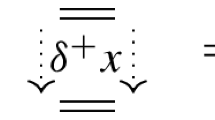Abstract
A calculus for a fragment of category theory is presented. The types in the language denote categories and the expressions functors. The judgements of the calculus systematise categorical arguments such as: an expression is functorial in its free variables; two expressions are naturally isomorphic in their free variables. There are special binders for limits and more general ends. The rules for limits and ends support an algebraic manipulation of universal constructions as opposed to a more traditional diagrammatic approach. Duality within the calculus and applications in proving continuity are discussed with examples. The calculus gives a basis for mechanising a theory of categories in a generic theorem prover like Isabelle.
PhD student at BRICS, Centre of the Danish National Research Foundation.
Access this chapter
Tax calculation will be finalised at checkout
Purchases are for personal use only
Preview
Unable to display preview. Download preview PDF.
Similar content being viewed by others
References
A. Asperti and G. Longo. Categories, Types and Structures: An introduction to category theory for the working computer scientist. Foundations of Computing Series. MIT Press, 1991.
H. Barendregt. Lambda calculi with types. In S. Abramsky, D. M. Gabbay, and T. S. E. Maibaum, editors, Handbook of Logic in Computer Science, volume 2: Computational Structures. Oxford University Press, 1991.
M. Barr and C. Wells. Category Theory for Computing Science. C.A.R. Hoare Series Editor. Prentice Hall, second edition, 1996.
I. Beylin and P. Dybjer. Extracting a proof of coherence for monoidal categories from a proof of normalization for monoids. Lecture Notes in Computer Science, 1158, 1996.
T. Braüner. An Axiomatic Approach to Adequacy. PhD thesis, BRICS PhD School, 1996.
M. Cáccamo, J. M. E. Hyland, and G. Winskel. Lecture notes in category theory. Available from: http://www.brics.dk/~mcaccamo.
G. L. Cattani. Presheaf Models for Concurrency. PhD thesis, BRICS PhD School, 1999.
R. L. Crole. Categories for Types. Cambridge Mathematical Textbooks. Cambridge University Press, 1993.
A. Joyal, M. Nielsen, and G. Winskel. Bisimulation and open maps. In R. L. Constable, editor, Proceedings of the 8th Annual IEEE Symposium on Logic in Computer Science, Montreal, Canada, June 1993. IEEE Computer Society Press.
G. M. Kelly. Basic Concepts of Enriched Category Theory, volume 64 of London Mathematical Society Lecture Note Series. Cambridge University Press, 1982.
S. Mac Lane. Categories for the Working Mathematician, volume 5 of Graduate Texts in Mathematics. Springer-Verlag, second edition, 1998.
T. Nipkow and L. Paulson. Isabelle HOL: The tutorial. Documentation included in the official distribution of Isabelle, Feb. 2001.
B. Nordström, K. Petterson, and J. Smith. Programming in Martin-Löf’s Type Theory. An Introduction. Oxford University Press, 1990.
L. Paulson. The foundation of a generic theorem prover. Journal of Automated Reasoning, 5(3):363–397, 1988.
L. C. Paulson. Isabelle: A Generic Theorem Prover, volume 828 of Lecture Notes in Computer Science. Springer-Verlag, 1994.
R. Pollack. The Theory of LEGO: A Proof Checker for the Extended Calculus of Constructions. PhD thesis, The University of Edinburgh, 1994.
D. Rydeheard and R. Burstall. Computational Category Theory. International Series in Computer Science. Prentice Hall, 1988.
M. Takeyama. Universal Structure and a Categorical Framework for Type Theory. PhD thesis, The University of Edinburgh, 1995.
Author information
Authors and Affiliations
Editor information
Editors and Affiliations
Rights and permissions
Copyright information
© 2001 Springer-Verlag Berlin Heidelberg
About this paper
Cite this paper
Cáccamo, M., Winskel, G. (2001). A Higher-Order Calculus for Categories. In: Boulton, R.J., Jackson, P.B. (eds) Theorem Proving in Higher Order Logics. TPHOLs 2001. Lecture Notes in Computer Science, vol 2152. Springer, Berlin, Heidelberg. https://doi.org/10.1007/3-540-44755-5_11
Download citation
DOI: https://doi.org/10.1007/3-540-44755-5_11
Published:
Publisher Name: Springer, Berlin, Heidelberg
Print ISBN: 978-3-540-42525-0
Online ISBN: 978-3-540-44755-9
eBook Packages: Springer Book Archive




